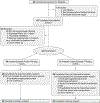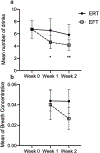Future thinking to decrease real-world drinking in alcohol use disorder: Repairing reinforcer pathology in a randomized proof-of-concept trial
- PMID: 35041442
- PMCID: PMC9450688
- DOI: 10.1037/pha0000460
Future thinking to decrease real-world drinking in alcohol use disorder: Repairing reinforcer pathology in a randomized proof-of-concept trial
Abstract
Reinforcer Pathology theory proposes that expanding the temporal window of reinforcement (i.e., reducing delay discounting) using episodic future thinking (EFT) would decrease alcohol consumption. However, evidence of effectiveness in real-world settings is lacking. Using a randomized proof-of-concept field trial, the current study examined the effect of expanding the temporal window of reinforcement, using remotely delivered EFT, on decreasing real-world alcohol consumption among individuals with alcohol use disorder (AUD). Fifty-two individuals (9 females) aged 18-65 years who met the DSM-5 criteria for moderate or severe AUD and aimed to drink in moderation or abstain from drinking completed the study and were included in analysis. EFT significantly (p = .031) reduced alcohol consumption (mean change of consumption pre-post intervention = -2.18 drinks/day) compared to control episodic recent thinking (ERT; mean change of -0.52 drinks/day). Changes in discounting rates pre-post intervention significantly predicted changes in alcohol consumption (coef. = .424, 95% CI [.043-.813], p = .030) even after controlling for age, gender, race, income, education, marital status, and family history of addiction. Overall satisfaction across groups was rated as 3.92 on a 1 to 5-point scale, suggesting that the current remote approach is feasible and acceptable. The current findings were congruent with the theory, Reinforcer Pathology, that EFT expands the temporal window and decreases alcohol consumption, and the remote approach was considered feasible and acceptable. We believe the present study contributes new knowledge with tangible benefits for scientifically understanding and better defining novel interventions that may be clinically deployed to improve treatment outcomes. (PsycInfo Database Record (c) 2022 APA, all rights reserved).
Trial registration: ClinicalTrials.gov NCT03340051.
Figures



References
-
- Alessi SM, & Petry NM (2003). Pathological gambling severity is associated with impulsivity in a delay discounting procedure. Behavioural Processes, 64(3), 345–354. - PubMed
-
- American Psychiatric Association. (2013). Diagnostic and Statistical Manual of Mental Disorders (DSM-5®). American Psychiatric Pub.
Publication types
MeSH terms
Associated data
Grants and funding
LinkOut - more resources
Full Text Sources
Medical
Miscellaneous

